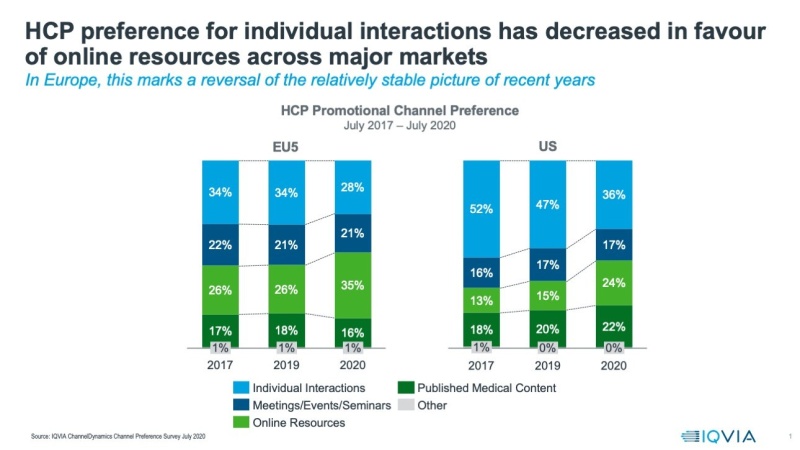Engaging HCPs remotely in 2021 and beyond

09 April 21
- Pharmaceutical
Are digital ways of working here to stay in a post-COVID-19 world?
In the UK, many are starting to see a light at the end of the lockdown tunnel following the timeline for easing of restrictions being laid out. A sense of hopefulness is in the air and many are planning the return to their pre-COVID routines both in a personal and professional sense. Although, when we look toward our professional routines, should we be in such a rush to return to the way things were before? I for one am looking forward to having more face-to-face interactions with my colleagues, but still want to maintain a balance with the remote ways of working that we have adjusted to over the past year. In this post, we’ll be exploring what the post-COVID world will look like for the pharmaceutical industry and healthcare professionals.
The impact of COVID-19 on Pharmaceutical Companies
It’s very likely that when it comes to engagement with healthcare professionals (HCPs), the traditional ways of working have irrevocably changed. The impact of COVID-19 pressured many pharmaceutical companies to work at an unusually rapid pace for the industry, forcing them to re-address how they engage with HCPs as a result of the lockdown measures. The sudden shutdown in face-to-face interactions between HCPs and field reps challenged them to develop increased remote engagement via online methods.
This itself has brought about its own set of challenges within pharmaceutical organisations. The industry has always been thought of as traditional and often slow to adopt digital technologies compared to other highly regulated sectors such as insurance and banking (McKinsey & Company).
This prior apprehension around adopting digital technologies is in part down to the traditional conservativeness of the industry. Often the risk has been perceived as being too high. Learn more about digital challenges and lessons for pharma companies. However, this means that pharma companies lose out on creating valuable touchpoints with HCPs if they do not adapt to meet their needs. Likewise, they risk losing out to competitors who are continuing to adopt more customer-centric approaches in the way they communicate. An example of this would be companies making resources available 24/7 to meet the needs of busy HCPs who might not be available in usual working hours.

Adapting to change
Over the last decade, it has become increasingly more competitive for pharmaceutical companies to have access to HCPs. With ongoing lockdown measures imposed, this has only got harder and will continue to get harder if pharma does not rise to the challenge. While the remote engagement of HCPs has been enforced upon the industry out of the logistical issues posed by COVID, pharma companies need to ensure they are evolving toward a more customer-centric model, offering flexibility on how and when HCPs choose to engage with them. This means that a cultural shift is needed internally within pharma, moving away from the traditional siloed, single-channel approach, toward a blended multichannel strategy that is based on decisions driven by data and insight. This will be a stark contrast for those in the industry that is the most behind in working with data and understanding their customer. These companies will be starting from scratch at a time when their more forward-thinking peers will already have many of the raw ingredients they need to begin working in this way.
Embracing the new normal
Historically, channel preference for HCPs has been skewed toward face-to-face interactions. This has long been the undisturbed norm as face-to-face allows you to read body language and gauge reactions, a skill that isn’t necessarily transferred well over the phone or on video calls. In addition, gone are many of the traditional triggers for a meeting. Dropping off sample literature will no longer get you access to an HCP working in a COVID-secure facility.
Yet as a result of the pandemic, we’ve seen a significant shift in the channel preference of HCPs as reported by IQVIA. When looking at the UK year on year between 2019 to 2020, face-to-face preference has dropped by 29% (41% in 2019 vs 29% in 2020) compared to an impressive 65% increase (17% in 2019 vs 28% in 2020) in online preferences.

While this growth in digital preference is impressive, this jump has largely been driven by the enforced use of remote tactics by COVID restrictions in place. However, Veeva predicts that nearly 70% of all HCPs will be digital natives by the end of 2020 and that a more blended approach is being adopted where more and more HCPs segments are digitally versed. Certainly, there is a desire from HCPs for a more mixed approach, with Accenture reporting that ‘87% of HCPs want either all virtual or a mix of virtual and in-person meetings even after the pandemic ends'. With this in mind, it’s important for Pharma to continue building upon its digital capabilities to meet the needs of a HCP base that is increasingly becoming more digitally native.
To understand what HCPs have engaged with during the pandemic, pharma companies need to run research, talk to HCPs to learn their preferences and review data around the types of content that has been accessed, when content is being used and what channels they get the best engagement on. This will help them to adopt a mantra of “the right channel at the right time”, enabling an environment that will allow HCPs to gain value and have greater flexibility in engaging with pharmaceutical companies.
While there will still be HCPs that have a preference toward face-to-face interaction, it’s imperative that pharma does not return to its traditional engagement models and fully embraces a mixed approach. Digital is here to stay and pharma needs to continue to rise to the challenge.
If you would like to learn more about how your company can prepare for the post-COVID world and the continued development of digital in the pharmaceuticals industry, please feel free to get in touch or share your challenges and goals with us in an Innovation Workshop.